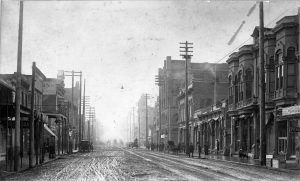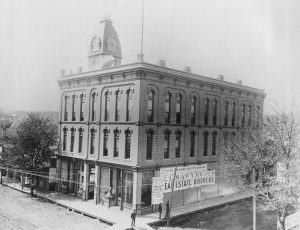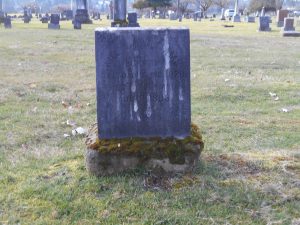Black people have played a significant role in Thurston County history. Early settler George Bush helped found Tumwater and Rebecca Howard ran the Pacific House hotel and restaurant in Olympia. However, the history of the Black community in the county at the turn of the century is poorly recorded. One noted person from this time was William Williams. After a long adventurous life, he spent his final years as a shoe shiner in Olympia.
 William Williams’ Life on the Frontier
William Williams’ Life on the Frontier
William “Bill” Williams was born in 1820 in Baltimore, Maryland. Not much is known about his early life. As a youth he worked in the city’s shipyards and became a lifelong member of a group of Black Masons. He left the city in 1847.
News of the California Gold Rush eventually brought him to San Francisco, joining at least 4,000 other Black men who had also decided to seek new opportunities in California.
Williams tried prospecting at Auburn. He later claimed to have collected 200 pounds of gold worth $50,000, but that it had been stolen from him. Deciding that selling to prospectors was more secure than mining, he worked at a restaurant in the camps. Then he headed up to Oregon, taking a job as a cook on steamships for several years.
Coming North
He was recruited to work for the British Hudson’s Bay Company. Williams traveled north, through the Walla Walla Valley. The Fraser River Gold Rush of 1858 in British Columbia beckoned and he left to try his luck at prospecting again.

Like many, it did not work out. He became a messenger for the customs, ferrying shipments of coins worth up to $20,000 to a sub-treasury. Then word came of another gold strike up at Cariboo and he moved again. Williams put in a gold stake but hedging his bets this time, also opened a restaurant catering to miners.
Considered by many to be one of the best places to eat north of the boundary with the United States, this restaurant was frequented by none other than legendary Olympian captain and restaurant founder, Woodbury Doane. “Captain Doane,” Williams later told reporters, “used to run his vessel there every night, and took his meals with me… He knew that I only handled the best, and that was what he was after.” Customers often paid with gold dust.
After the Gold Rush cooled, Williams eventually made his way to Seattle where he opened a restaurant. Sometime in the mid-1880s, perhaps because of Captain Doane, he moved to Olympia. Now elderly, he took a job as a bootblack, polishing and shining shoes.
A Black Man’s Life in Olympia
Shining shoes was a hard way to make a living, and was often practiced by children and minorities. He kept his stand in front of Young’s Hotel on Main Street for a long time, before moving his stand sometime around July 1893 to the west side of the street where there was heavier foot traffic.

By October 1896, he had moved his stand to the outer edge of the sidewalk near the corner of Fifth and Main Streets, near the Odd Fellows Hall. It was there that he met Governor John Rogers. In a story widely repeated in local papers, Rogers – who never had his shoes shined – came up to Williams as he walked down Main street. Rogers was very unpopular in Olympia but when Williams took off his hat to him, Rogers handed him a nickel declaring that, “Any one in the city of Olympia who will take off his hat to me is deserving of a reward.” Or at least that’s how the Morning Olympian told the story.
William Williams’ Last Years
But Williams was getting on in years and many days he had few customers. Some sources state he received county support. His final months were eased when James Doherty, a Black miner who had struck a small fortune on the Klondike, gave some money to his old friend. He sent him $100 for proper clothes and he deposited $250 with the firm Scott & Quinn in April 1898, to forward as needed. This was enough to cover Williams’s funeral and burial expenses, including a headstone, with $20 left over.

William Williams died August 3, 1898. He was 78. He had fallen the week before in front of the old Pacific House on his way home to the Huggins hotel. Olympia had lost one of its most well-liked residents: he had become a bit of a local celebrity and while he faced discrimination, many respected him.
“In [boot-blacking], as everything else,” wrote the Morning Olympian upon his death, “he did his work well. Nobody could get a better shine of leather than ‘Uncle Bill;’ nobody could whisk the broom with better grace in completion of the job.” He knew his customers well, “quick to recognize in his customers those salient traits of individuality which make the man. He was seldom mistaken in his estimate of human character. His experience and liberal education well fitted him to buffet the tempestuous waves of life. He spoke several languages with fluency [Spanish, French, German and Chinook Jargon by another account], and possessed an inimitable fund of humor that was frequently exhibited in relating bits of experience interspersed with anecdotes of the times he had passed through and the men he had met.”
Williams lived a very interesting and adventurous life. He is a reminder of the long history of Black people in Thurston County.


















































